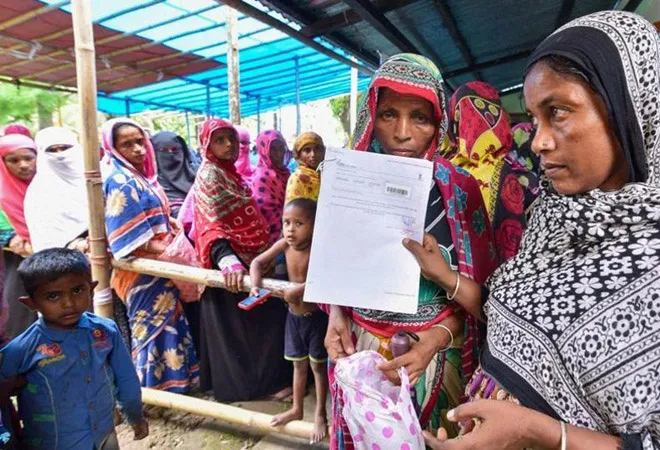
The recent controversy over the exclusion of 41 lakhs of the total 3.29 crore applicants for the National Registrar of Citizenship (NRC) in Assam has left more questions than answers.
The NRC, first of its kind in India, is unique to the State of Assam, and is being done under the aegis of the Supreme Court. The purpose of the NRC exercise is to identify infiltrators from neighbouring Bangladesh, living illegally in the State.
The exclusion of a large number of applicants, many claimed to be genuine Indian citizens, have raised an array of doubt about the ability and sensitivity of the bureaucratic mechanism in dealing with the mammoth task of registering citizenship in bulk.
Besides, the present draft NRC points to the state of governance in the bordering States that enabled migrants to infiltrate and settle in such a large number.
The dominant question looming around is about the future of the people who have so far been excluded and about the roadmap the government is taking in dealing with such a situation. The popular narratives on the NRC render no answer. India have to be pragmatic in finding a solution.
For long, the Assamese society had been claiming of infiltration from Bangladesh, fearing that the migrants would outnumber them. This was a cause of ethnic-linguistic tensions in the State which had turned violent in the 1980s. Assam witnessed six-year long violent movement against illegal migrants in the 80s.
The Assam Peace Accord, signed in 1985 between the Government of India and leaders of the All Assam Students Union in the presence of then Prime Minister Rajiv Gandhi, was an outcome of this movement. The Accord promised to resolve illegal migration.
The popular notion, however, is that the government have not done enough in solving Bangladeshi infiltration. Contrary, some political parties who have ruled the State for years, have been accused of vote bank politics and appeasing the migrants by helping them in acquiring documents like the voters identity cards, that in a way legitimise their stay.
The NRC is the outcome of a petition submitted by a non-government organisation from Assam seeking a solution.
The mood of the people suggest peoples’ disenchantment with the political leaderships and this certainly signals a difficult phase for India’s democracy.
Ideally, issues like citizenship should be dealt with by the political leaderships because they are considered to represent peoples’ voices. This is, primarily, important in a State like Assam, which has a multi-ethnic and multi-cultural society with many complexities.
Notably, a substantial number of Bengalees have been residing in Assam way before the independence of India and they have had contributed to the vibrant multicultural society of the State. The Bengalee-dominated Barak Valley, comprising districts of Cachar, Karimganj and Hailakandi, was once part of the greater Sylhet district of the United Bengal, which was clubbed with Assam in 1872. Bengalees of Assam take pride in their linguistic and State identity. They are often embarrassed by the migrant Vs indigenous debate.
Initially, people desired a political solution to the issue. However, they all welcomed court mandated NRC, believing it will end the debate over foreigner Vs indigenous. But, today, people from all ethnic groups are in shock and agony. People are blaming the leaderships, irrespective of political divides, for keeping the issue alive for gaining political mileage.
In spite of assurances that no genuine Indian citizen will be left out in the final draft, people’s confidence over the system is tumbling. Again, authorities have promised to provide opportunity to approach the judiciary to redress complaints of exclusion from the final list. Considering the present capacity to resolve cases in the court, which are already overburdened, getting relief through the legal process is expected to be lengthy and expensive. All might not even have the means to file a claim. Also, the numbers of the claimants are speculated to be in lakhs.
Suggestions are made about deportation of migrants to Bangladesh. Bangladesh has declined the claims of illegal migration. Hence, justifiability and practicality of such an alternative is doubtful. Keeping geo-politics in mind, this is neither recommendable because Bangladesh remains one of the trusted friends in the neighbourhood and contributes substantially to maintain peace in Assam by helping in arrests of many insurgents.
The people of Assam have shown resilience and maintained peace, but that might not be the situation for long. People are now demanding clarity on the NRC issue, because ultimately it’s their life at stake.
The views expressed above belong to the author(s). ORF research and analyses now available on Telegram! Click here to access our curated content — blogs, longforms and interviews.




 PREV
PREV


